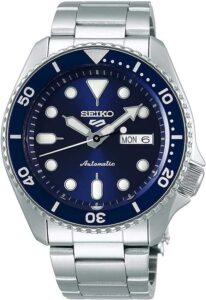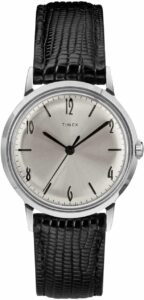 Mechanical watches are more than just devices for telling time; they’re a blend of art, history, and engineering. These watches have been around for centuries, with roots tracing back to the 16th century. Unlike their battery-powered quartz counterparts, mechanical watches work through a complex system of gears and springs, creating a tangible connection to timekeeping traditions.
Mechanical watches are more than just devices for telling time; they’re a blend of art, history, and engineering. These watches have been around for centuries, with roots tracing back to the 16th century. Unlike their battery-powered quartz counterparts, mechanical watches work through a complex system of gears and springs, creating a tangible connection to timekeeping traditions.
The differences between mechanical and quartz watches are pretty significant. Quartz watches rely on electronic oscillation regulated by a quartz crystal to keep time. On the other hand, mechanical watches operate solely on mechanical power, coming from hand-winding or automatic movement. This fundamental difference is why many collectors and enthusiasts find themselves drawn to the analog beauty and intricate mechanics of the latter.
Enthusiasts might argue there’s something special about mechanical watches. The craftsmanship, attention to detail, and the history they carry make them more than just a tool for tracking time. It’s the personal connection to the watchmaker’s artistry and the rhythmic dance of gears and springs that turn many into lifelong admirers. Owning a mechanical watch isn’t just about following the time; it’s about appreciating the journey time takes through the elegant mechanism on your wrist.
Understanding the Components of a Mechanical Watch
Ever wonder what goes on beneath the dial of a mechanical watch? It’s a miniature world filled with tiny components, each one crucial to keeping time ticking away accurately. These parts come together in harmony to form the ‘movement’, which is essentially the heart of the watch.
The movement is made up of gears, the mainspring, the escapement, and the balance wheel—all working together to regulate time. The mainspring is what stores and releases energy, while the balance wheel works like a small pendulum, ensuring consistent timekeeping. It’s this intricate dance of components that makes mechanical watches so fascinating.
Quality matters a lot in these timepieces. The materials used in crafting the watch play a big role in its durability and lifespan. High-end watches often feature components made of stainless steel or precious metals, which offer resistance to corrosion and wear and tear. Sapphire crystal for the watch face is also a common choice for its scratch-resistant properties.
Craftsmanship is another key factor in longevity. Hand-assembled watches often provide more precision and care compared to those mass-produced. This attention to detail not only adds to the watch’s lifespan but also to its intrinsic value, turning a simple timepiece into a work of art.
When you’re choosing a mechanical watch, consider the brands known for their craftsmanship and quality materials. They might be a bit pricier, but investing in quality pays off in the long run, both in terms of longevity and in the sheer joy of owning something meticulously crafted.
Factors That Influence the Lifespan of a Mechanical Watch
Mechanical watches are like little machines, and just like any machine, how long they last depends on a bunch of factors. You might be surprised at just how much these little things can be influenced by how and where you wear them.
The way a watch is used probably has the biggest impact on its lifespan. If it’s a daily wearer, expect signs of wear and tear sooner compared to a watch that’s kept for special occasions. Regular use means more exposure to bumps, scratches, and the like, which can gradually affect the internal mechanics too.
Maintenance is another biggie when it comes to extending the life of a mechanical watch. They need servicing every few years to keep them running smoothly. A professional check-up can prevent minor issues from ballooning into big, expensive repairs. Think of it as a routine check-up for your watch to keep it in tip-top shape.
Environmental factors can’t be ignored either. Temperature swings, humidity, and water exposure are not friends of mechanical watches. Extreme heat can affect the oils in the movement, while moisture can lead to rust and other issues. It’s crucial to be mindful if you’re taking it in for a swim or subjecting it to extreme conditions—those little components inside are sensitive.
To make sure your timepiece stands the test of time, it’s all about being aware and proactive. A little careful thought about where you wear your watch and keeping up with maintenance can make a huge difference in how long it keeps tick-tocking reliably.
Best Practices for Extending Watch Longevity
Mechanical watches, like any fine instrument, can last generations with the right care. Intrigued by how you can maximize the lifespan of your prized timepiece? It’s all about mindful maintenance and handling.
Storage is where it all starts. When not wearing your watch, it’s best to keep it in a dry, dust-free case. Some folks even go for a watch winder, especially for automatic watches, to keep them wound and running smoothly. If you decide to store it somewhere for a while, make sure it’s away from magnets, as they can mess up the accuracy.
Regular maintenance checks are essential—think of them as the watch’s health exams. Every few years, a visit to a professional for a service can help catch issues before they turn into costly repairs. They’ll clean the movement, lubricate the parts, and ensure everything is functioning as it should.
People sometimes forget, but handling the watch correctly can prevent unnecessary wear. Avoid winding it while it’s on your wrist to reduce strain on the crown and stem. And definitely resist the urge to reset the date at midnight; that’s prime time for gear damage!
Watch out for the common pitfalls. Be wary of water—you’d be surprised how many watches suffer from water exposure simply because someone forgot to screw down the crown. And while everyday wear is inevitable, try to rotate your watch with others, especially if you have a collection, to evenly distribute the wear.
By simply taking these small steps, you’ll ensure not just the life of your mechanical watch, but also its precision. These practices uphold not just function but also the beauty of your timepiece, keeping it ticking for future generations to enjoy.
Signs Your Mechanical Watch Needs Attention
Mechanical watches, while durable, do show signs when they’re in need of a little TLC. Keeping an eye out for these warning signals can save you from costly repairs later on.
A first sign of trouble is when your watch starts running fast, slow, or stops altogether. Inaccurate timekeeping usually indicates the movement might need cleaning or servicing. If you notice this, it might be time to consult a watchmaker.
Another thing to watch for is any unusual sounds. A mechanical watch typically has a consistent tick, so any grinding, rattling, or irregular ticking noises can indicate internal issues. It’s always better to catch these early.
Check the visual aspects too. If there’s condensation under the crystal, it means moisture has breached the watch case, which can be a serious problem long-term. Even if the condensation clears up, it’s worth getting this checked to avoid rusting or damage internally.
Strap problems can also hint at the need for maintenance. If leather or metal straps start to degrade, it can affect how securely your watch is held, increasing the risk of drops or impacts. In this case, it’s best to replace or repair the strap before it becomes a bigger issue.
Your watch’s warranty terms can offer guidance on when to get a service as well. Review them to understand the coverage and recommended service intervals. Being proactive with these warranties can sometimes mean the difference between a straightforward fix and a costly overhaul.
Catching these signs early not only keeps your watch running smoothly but also ensures that it remains a reliable companion. Regular check-ins with a professional can save headaches down the line and maintain the watch’s elegance and precision.
Our Top Affordable Mechanical Watch for Beginners
(two options modern vs. retro)
Seiko 5 Sports SRPD51
The Seiko 5 Sports line is often considered the gateway to mechanical watch collecting. The SRPD51 offers exceptional value with it’s in-house 4R36 automatic movement, 100m water resistance, and versatile dive watch design.
This watch can handle daily wear with ease and looks great on a variety of straps.
Key Features:
- In-house Seiko 4R36 automatic movement
- 100m water resistance
- Day-date display
- 41mm stainless steel case
- Unidirectional rotating bezel
Timex Marlin Hand-Wound
If you’re interested in experiencing a manual-wind movement, the Timex Marlin offers a faithful reissue of a 1960s design. It’s smaller 34mm case size is perfect for those who prefer a more vintage-inspired look.
Key Features:
- Manual-wind movement
- 30m water resistance
- 34mm stainless steel case
- Acrylic crystal for vintage appea
The Lifespan of Mechanical Watches: Setting Realistic Expectations
Mechanical watches can last a lifetime, and often much longer, when cared for properly. But understanding what contributes to their longevity can help set more realistic expectations.
Many watch enthusiasts and experts agree that with the right maintenance and handling, a mechanical watch can easily last decades—sometimes even a century. The key to this longevity is regular servicing, quality craftsmanship, and mindful usage.
There are stories of watches passed down through generations, each wearer adding their layer of history to the timepiece. These heirlooms are cherished not just for their function, but for the connections they represent and the stories they carry.
When considering the lifespan of a mechanical watch, it’s important to balance sentimental value with practicality. A well-maintained watch is not only a ticking piece of art but also a reliable companion that fits seamlessly into the rhythms of daily life.
Investing in a quality mechanical watch is about enjoying both its form and function. Whether you’re a collector, an enthusiast, or simply someone who appreciates fine craftsmanship, understanding the factors that influence longevity can help you make informed decisions, allowing your mechanical watch to become an enduring part of your life.
